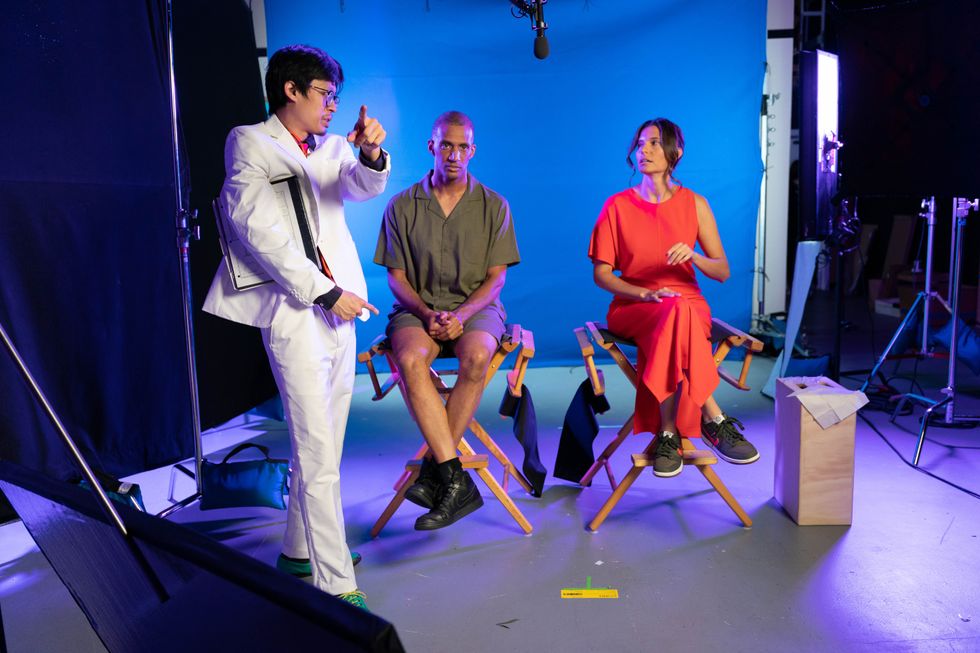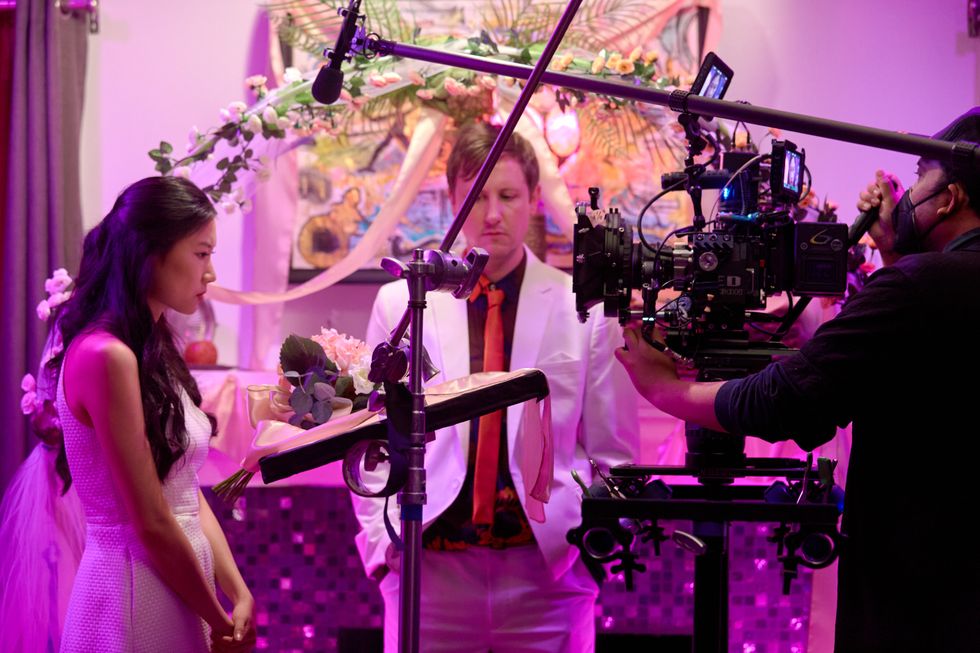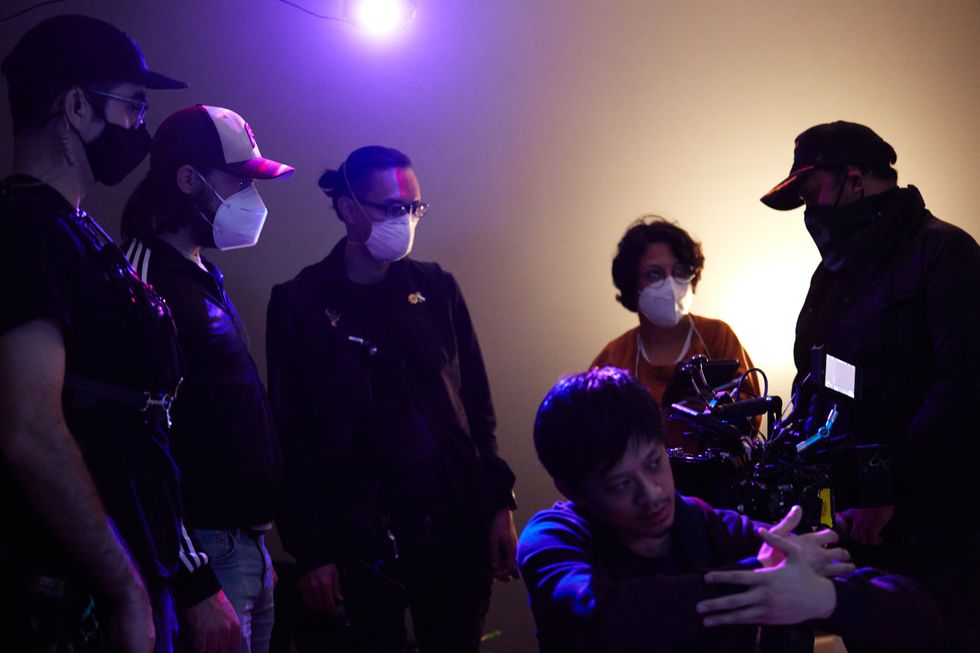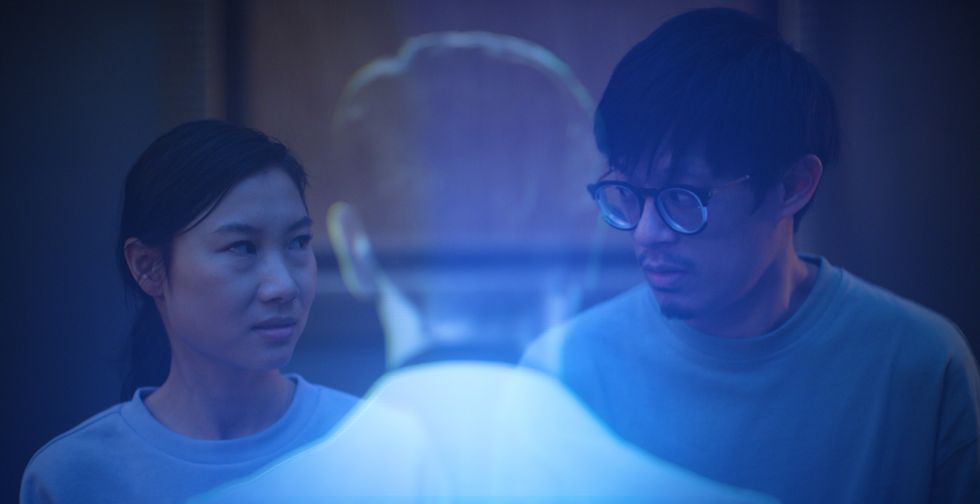
Stanley Wong’s Future Date—a sci-fi satire on the absurdities of romance and general human connection hidden within the frameworks of a dystopian COVID rom-com—is really something special. Made and certainly about “COVID times”, it uses the weird time capsule we all lived through (remember?) to tell a grander story about how hard and weird human connection can be just, like, in general, man.
Future Date takes place in a dystopia of quarantine where COVID-19 isn’t so much a problem as the extremities of climate change making it impossible to survive out doors, thus isolating our beloved human race to keep to themselves more-or-less. Everything is remote and virtual, food is artificial and made via a generative microwave apparatus, daily reports update how unlivable the conditions of the outside world are progressively getting, Silverlake is just gone.
So how do you find love in a place like this?
Stanley (Co-Writer/Director/Lead) explores this very idea in all sorts of creative, funny, and, yes, heartfelt ways. This isn’t a boring “what if COVID movie” by any means—it’s an exploration of our modern culture through an extremely creatively made, pretty-lookin’ film.
No Film School was lucky enough to catch up with Stanley at Cinequest, where he talks his background in character acting, thoughtfully crafting a unique future, and sticking true to his emotional truth in the end.
Do enjoy, and check out Future Date on Cinejoy by March 31.
Editor’s Note: The following quotes are edited for length and clarity.
From ’21 Jump Street’ to ‘Future Date’

“I didn’t do the Steven Spielberg thing at all. I just played a lot of video games. But I did watch a lot of movies. Being an Asian dude growing up in a small town in Louisiana, there was a lot of… I’m an introvert, spent a lot of time just thinking about stuff.
I would write stories and stuff, I guess. But, yeah, I didn’t really get into film until… I was originally a computer engineering major, and I actually switched after Hurricane Katrina, and I became a film major.
I’ve just been trying my hardest to keep going from there. I have a pretty crazy history. I went to film school, and I wanted to learn everything so I could direct. I felt like you have to do everything to some extent in order to direct.
From there I was a union electrician for a little bit. I worked on Green Lantern and The Mechanic. I’ve also been a character actor—being an Asian in Louisiana was its own weird asset.
My second audition I ever got was 21 Jump Street where I needed to play a nerdy Asian dude.
Thank God for representation and whatever. But back then just me being the nerdy Asian dude in 21 Jump Street honestly meant a lot to people. It’s pretty crazy. Or even The Big Short. I was the accountant in that. That’s just a small little local role.
But, man, it’s a cultural moment, which is kind of cool.”
How ‘Future Date’ Came to Be

“I’ve always made movies, but it took, I guess, the pandemic to get me to make a feature.
Yeah. The pandemic, everyone went through it, but it was just enough of a kick in the ass that I was just like, ‘No, I got to make a movie no matter what. I can’t wait anymore.’
But at the time we were writing in 2021, I really thought… We were in lockdown. I really didn’t know if we would ever get out. So I was talking to my writing partner. I was just like, ‘We need to write something that we can shoot within these conditions.’
There were pandemic movies that were coming out at the time, and I was just like, ‘These are not fun to watch. These are not really cool at all.’ So I knew that we had to make something within those confines. I was going through just pandemic dating. It was super weird. It was very particular. I just felt like I had a lot of stories and enough to work with to make a story, but it was still small. I had this very small story, and I was like, ‘I guess I just want to tell this in the biggest way possible.’
The stocks were doing really well at the time, so I was just like, “You know what? I’m not trying to save up for a house. I don’t really have a family or anything.” So it’s like, “I’m just going to take out a chunk of money.”
It was honestly 60k, and I was like, “If we make it for this much, we wrote a story simple enough that it’s like, no matter what, I know people can make…”
In an interesting way, our 60k movie just was able to have more resources available. We just started going, and we didn’t really have any help along the way. We tried to get a producer and, I don’t know, were just like, “You know what? Forget it. We’re just going to do it on our own.”
A lot of it was really just like I have had enough waiting for people to give me permission. I was just like, “I don’t give a shit anymore. I’m just going to do it.” There was even opportunities where people were like, “Oh, hey, maybe we can get some more money,” and I’m like, “I don’t care. I’m starting this. We wrote this to be small. Getting more money is not going to help us. It’s a small project.”
We just fucking muscled through it.
It’s ironic that we started writing in 2021. We were going to write essentially a small story in the biggest way possible. We took a year for us to write it, and then we shot it for a month, and then it took two years to do all the post. Just ironically, everything’s over now. Everything’s opened up. But I think it’s still kind of cool. Our movie is about a very specific time and a very specific thing, and it’s like a time capsule.
I don’t know. It’s pretty bonkers, pretty crazy.”
Building the Future of ‘Future Date’

“There’s only two locations. It’s always indoors. We never see the outside.
We were able to shoot chronologically. We had to shoot it in two parts because my co-star, Shuang, she was shooting another movie in Australia, Five Blind Dates, which just came out last month. It’s the first Amazon Australian original movie.
But her movie was obviously… She couldn’t move that. That was also a crazy thing where I was… It just made sense, and, actually, honestly, I’m glad we did it. We split up our shoot into two parts. She shot our movie in February and then she left. We shot one half of our movie. We edited that one half. That was very instrumental in us being able to shoot the second half because there’s a lot of green screen and stuff.
We were basically shooting a lot of the reversals. But then, also, it gave us time to figure out how to build a future apartment. We built a crazy little tiny apartment and added all this future shit in it.
Shout out to Remmet because that was the second time I’ve used them. They were great. I had a production designer, Liz Flores, who was amazing. She was a grad student in San Diego State, I think. She designed a future apartment for us. It was going to be small, because that was the idea, that our movie’s going to be small but we’re just going to go nuts.
We were building a vision of the future, watching Back to the Future 2 and Black Mirror and all that stuff. It was really cool. We got to add a lot of detail building a vision of the future, but we had to do it on a budget, and it was just really fun every step of the way.
Even with the music, I was talking to the composer, and it’s like, “Yeah, let’s make something we’ve never seen before or never heard before, rather, every step of the way.”
The, at least, design mantra was that the future stuff, we were just going to create in every step stuff we had never seen before, whether it was in color, cinematography, music, production design. We were just going to build things that we hadn’t seen before because it’s the future. We should be creative.
But then the house portion was supposed to represent the present or whatever, just the world that we know. For cinematography, we used very clean lenses. We would use LEDs with all these saturated colors. But then once we got into the house, it’s just an Airbnb. We were using vintage lenses. We were using more of a naturalistic lighting color palette.
So, yeah, it was fun to just build out the movie that way.”
Editing ‘Future Date’

“I did a lot of the editing. Honestly, I had an editor, but it was really like he was a working editor. He could come on when he wasn’t working.
So, really, we essentially two years of post. For the first six months, I had to edit, and that sucks. I had to grind the first couple of cuts. But then he came on, he did a lot, and then I came back on and… Really, again, I was watching this movie every day.
There’s some interesting statistics about [how true to the script the edit is]. It was a 98-page script, but it was, I feel like, just so meticulous. I don’t know how it ended up, but our first cut was only 88 minutes, so even at a first cut it was already less than a page a minute.
Actually, the farthest we got with it, as far as slimming down, making it just really tight, was 74 minutes. We got it down to 74. But, honestly, that was almost too fast. In my mind, I felt like, “Oh, this is just two people in a house. Let’s not overstay our welcome even a second.”
But, actually, there was almost a negative effect of it was so fast that anything that just wasn’t super fast felt like a snail’s pace. We’re at 82 minutes now. So it’s interesting that it actually feels shorter in a way by being longer. But I think we got it at a good nice 80.”
Stanley’s Advice to Filmmakers?

“I don’t know. Yeah. I think I didn’t quite get into this, but a big part of it, too, is just I’ve been a side character. I’ve always just played side characters in these movies, and, in some respects, I feel like I’ve played just a side character in my own life, so it’s been interesting trying to take control of the narrative again.
I put myself in my own movies. I think, for sure, I’m taking control of my career. I’ve made this movie to be an acting calling card and a directing calling card. I think, at the very least, no matter whether you like it or not, I can sell people, “This movie is me.” I think that’s what good art does, is it gives you a chance to show people who you are, and it gives you yourself a chance to develop who you are, to develop a voice, to find out what about you is particular.
I hope people can get that out of the movie because, again, if anything, this movie is a very specific portrait of where I was at the time. I think all my movies are, even my shorts. No matter what happens with this movie, I can just tell that I’m going to be able to make another movie, and I think that’s really cool.
I’m really happy. So I guess as far as what people should do, I think you said what advice to give, it’s just like people just have to do it and… It’s getting easier, too. It’s in a scary time but it’s also a really exciting time. We’re really going to be able to do anything we want with just even our own resources.
It’s a really exciting time to be a creator, and there’s no excuses anymore. Yeah, there really aren’t.”
You can watch Future Date now on Cinejoy through March 31.
Author: Grant Vance
This article comes from No Film School and can be read on the original site.
